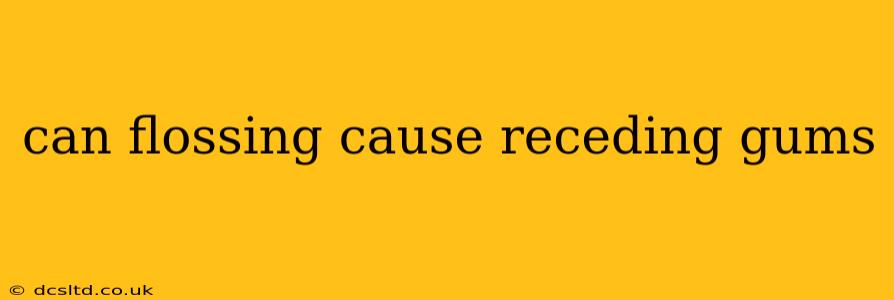Can Flossing Cause Receding Gums? The Truth About Flossing and Gum Health
The question of whether flossing can cause receding gums is a common concern among those committed to oral hygiene. While flossing is crucial for preventing gum disease and maintaining overall oral health, the technique used plays a vital role in preventing potential complications. Improper flossing can contribute to gum recession, but it's not the act of flossing itself that's the culprit. Let's delve deeper into this important topic.
What is Gum Recession?
Gum recession is the process where your gums pull back from your teeth, exposing more of the tooth's root. This can lead to increased sensitivity, tooth decay, and even tooth loss if left untreated. Several factors contribute to gum recession, including genetics, aggressive brushing, gum disease (periodontitis), and, as we'll discuss, improper flossing techniques.
How Can Flossing Incorrectly Cause Receding Gums?
The key here is how you floss. Aggressive or improper flossing techniques can damage the gum tissue, leading to recession. Here's how:
- Using excessive force: Snapping the floss between teeth or sawing it back and forth aggressively can injure the delicate gum tissue. Think gentle, C-shaped motions against the tooth's surface, not a forceful sawing motion.
- Using the wrong type of floss: Some floss types, particularly those that are too thick or unwaxed, can be more abrasive and increase the risk of gum damage. Experiment with different types to find what works best for you and your gum sensitivity.
- Flossing too hard: The goal is to gently clean below the gumline, not to force the floss into the gums. Overly forceful flossing pushes the floss into the gum tissue, causing damage that may lead to gum recession.
What are the Signs of Gum Recession?
Recognizing the signs of gum recession early is crucial for preventing further damage. These signs include:
- Longer-appearing teeth: Your teeth might appear longer than usual because more of the root is exposed.
- Sensitive teeth: Exposed tooth roots are more sensitive to hot and cold temperatures.
- Bleeding gums: While some bleeding is normal, persistent or excessive bleeding is a warning sign.
- Loose teeth: In advanced cases, gum recession can lead to tooth loosening.
How Can I Floss Properly to Avoid Gum Recession?
Proper flossing technique is paramount in avoiding gum recession and maintaining good oral health. Here's a breakdown:
- Use the right amount of floss: Take about 18 inches of floss, wrapping most of it around your middle fingers.
- Hold the floss gently: Use your thumbs and index fingers to grip the floss.
- Guide the floss gently: Curve the floss around each tooth in a "C" shape, and gently slide it up and down against the tooth’s surface. Avoid snapping or sawing.
- Go below the gumline: Gently slide the floss beneath the gumline, hugging the tooth. Avoid forcing it in.
- Clean each tooth surface thoroughly: Repeat this process for each tooth, using a clean section of floss for each tooth.
Is Flossing Necessary If I'm Prone to Receding Gums?
Yes! Proper flossing is still vital even if you have a predisposition to receding gums. The key is to employ the correct technique, being gentle and avoiding excessive force. If you're concerned about your gum health, consult a dentist or periodontist for personalized guidance and treatment.
What if I already have receding gums?
If you are experiencing receding gums, it is crucial to consult a dentist or periodontist immediately. They can assess the cause and recommend appropriate treatment options such as gum grafting or other periodontal procedures.
Remember, proper flossing is an essential part of maintaining healthy gums. By practicing gentle, effective flossing, you can avoid damaging your gum tissue and prevent the onset of receding gums. If you have any concerns, always consult a dental professional.
